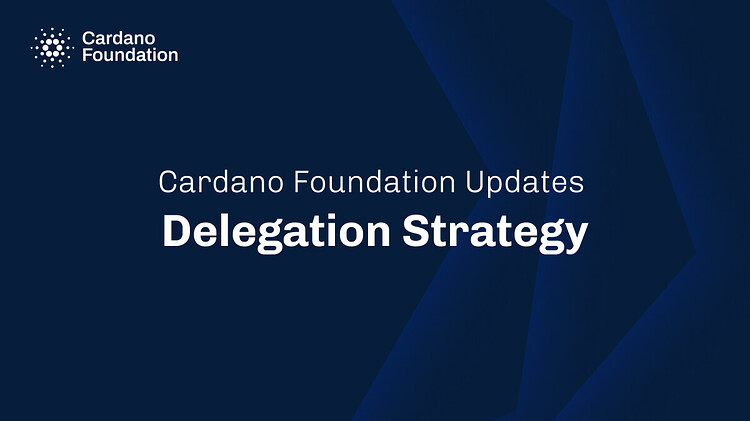Over the past two years our delegation strategy has seen significant growth and engagement. During this period, we conducted seven delegation rounds, showcasing our commitment to the continuous development and decentralization of the ecosystem. We received 1731 valid applications from various pools, with 454 of these shortlisted, and an average of 65 pools making it to the shortlist per round. Most notably, over the course of these seven rounds, we delegated to 351 pools and of this number, 161 were unique pools. This indicates the high standards and competitiveness that underpin our selection process.
We want to continue to encourage people to build something that the community needs, is open-source, and helps the ecosystem thrive. However, the requirements of a protocol constantly evolve as the full technology stack gets deployed. Therefore, the Cardano Foundation frequently revisits and updates its delegation methodology in order to better support the Cardano community and, as such, we are announcing some changes to our delegation methodology.
Each of the following changes are aimed at further improving the quality and effectiveness of our delegation approach:
- Delegation Duration: Instead of a short delegation period of about three months we will move to an extended period of approximately 12 months. An extended delegation period will benefit operators, allowing them to really focus on their contributions.
- Delegation Packages: We will reduce the number of pools we delegate to, which will increase the size of the packages. This, combined with extended delegation duration, will help enhance the overall quality of our selections plus allow pools to flourish and establish themselves more effectively.
- Delegation Criteria: We will remove the single pool requirement which will ensure greater flexibility in our selection process. This new approach aims at greater inclusivity.
- Selection Process: Our team will now handpick pools based on the data and insights we’ve gathered. This ensures that our delegation strategy is driven by experience and thorough understanding.
- Expectations: We understand that greater delegation may tempt pools to raise fees, however, we want to clarify that if pools increase costs or raise fees, we may withdraw delegation. Also, we will closely monitor pools and engage with them on a regular basis to understand how they are actively contributing to the ecosystem.
- Application Process: As the regular delegation rounds will be replaced with the extended delegation, we will change the application format to a single form. If you are a new pool or undertaking a novel initiative that you believe merits attention, you can use this form to submit your pool for consideration.
Additionally, the Cardano Foundation launched its own stake pool [CAG]. Maintaining and running a stake pool for a fraction of our own assets means the Foundation will obtain a genuine understanding of topologies, building from source, pre-releases, hard fork preparations, server-resources and network bandwidth. This firsthand knowledge is essential for refining our decisions and offering more nuanced support to our community.
To support this project, we will rebalance the ada across our wallet addresses. A number of our existing wallets will now contribute to funding the CAG stake pool. Meanwhile, the Foundation will continue to use one of its wallets to keep the one year delegation to WRFGS, the Switzerland for UNHCR pool. We continue to work with pool.pm to showcase our wallets and current delegation packages. The Cardano Foundation expects the next redelegation round in accordance with this new delegation strategy to happen around mid October.
Remarks/Footnotes: (from discussions below)
- The number of pools will go down from 46 to around 32.
- There is no deviation from the core strategy of “Supporting the Architects of the Future”: Cardano Foundation's New Delegation Methodology: Supporting the Architects of the Future. We want to support people who build infrastructure and tools(preferably open source) that are important for everyone. Some examples from the thread:
We want to support the people who create value on Cardano; who build the tools that others can use to build on Cardano; that contribute to projects like the Developer Portal ; who create Cardano Improvement Proposals (CIP) ; and participate in the discussions to define new standards.
We want to encourage people who are active in the Cardano Stack Exchange (CSE) and the Cardano Forum.
We want to encourage people to build what that community needs, create open-source solutions, and help the ecosystem thrive.
- While developers are a key component of this strategy, the support is not limited only to them; it extends to any entity that contributes meaningfully to the ecosystem rather than merely enriching themselves or solely promoting their own brand.
- Removing the “single pool”-requirement does not in any way mean that the Cardano Foundation is suddenly delegating to large pool clusters. And especially the Foundation will not delegate to a pool which is part of the top 50% stake owner. This ensures the delegation does not worsen the chain’s minimum attack vector.
Minimal technical requirements for pools.
We currently require that pools have the following setup so that they can get delegation:
- At least two relays registered on chain. Separate IP not just different port numbers. You can check this through dbsync or for example https://cardanoscan.io or https://adastat.net has a nice interface for that.
- The relays should be running an up-to-date version of cardano-node. This can be verified with
cardano-cli ping’s query command.
In the future we are thinking about (these are considerations that are not yet implemented) requiring:
- at least one relay runs with p2p enabled. This can also be verified with
cardano-cli ping.
